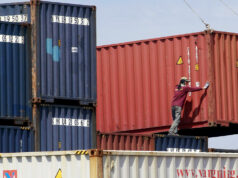PHL woos US aid agency after getting low marks in scorecard
THE Philippines on Friday defended the Duterte administration’s efforts to combat graft, after the country failed to meet the standards in fighting corruption and upholding the rule of law in a new scorecard issued by the US government’s Millennium Challenge Corp. (MCC).
In the MCC Scorecard for fiscal year 2018, the Philippines did not meet the performance standard for “control of corruption” with a score of 0, and “rule of law” with a score of -0.01. Both were the median or threshold scores for the country’s income group.
“The Philippines remains firmly committed to the rule of law and strictly adheres to due process. The President has also made clear that his platform of government will be based on zero tolerance for corruption in government,” Finance Secretary Carlos G. Dominguez said in a statement on Friday.
Mr. Dominguez also noted there were “inherent time lags” in the third-party data used by the MCC in its scorecard. He pointed out the country’s score in control of corruption and rule of law were based on the aggregation of quantitative assessments and perception surveys collected by the World Bank in partnership with Brookings Institution in 2016.
“We have been informed that we are at the median level in these two indicators, which we believe we can improve as we work together with the MCC to enlighten them about our effective efforts to weed out corruption in the Philippine bureaucracy,” he said.
Presidential Spokesperson Harry L. Roque, Jr. said the MCC’s ratings “may not completely reflect the reform initiatives of the Duterte administration in the area of fighting corruption and good governance.”
The government is hoping to convince MCC to resume its development assistance to the Philippines, after a five-year grant worth $433 million expired in May 2016.
“The scorecards are only one of the factors that the MCC Board takes into consideration when making re-selection decisions. We are confident that the Board will take into consideration relevant information and recent data on our very deliberate efforts to improve the ‘control of corruption and adherence to the ‘rule of law,’ indicators,” Mr. Dominguez said.
As examples, the Finance chief said Mr. Duterte “cleansed the corruption-plagued Bureau of Corrections,” and created the Presidential Anti-Corruption Commission to investigate cases of corruption involving presidential appointees.
The MCC uses the scorecard to determine if a country is eligible for development assistance. The publication of the scorecard is the third in a four-stage selection process which starts with the identification of candidate countries, followed by the publication of MCC’s selection criteria and methodology report.
The final stage takes place in December when the MCC board of directors select the countries deemed eligible for development assistance.
“In determining country eligibility, the Board considers three factors: A country’s performance on the indicators; the opportunity to reduce poverty and generate economic growth within a country; and availability of funds,” the MCC said in its website.
The Philippines’ previous MCC grant was not renewed last December. At that time, US embassy spokesperson Molly Koscina said this “reflects the Board’s significant concerns around rule of law and civil liberties in the Philippines.”
Mr. Duterte has previously lashed out at the United States and then President Barack Obama for criticizing his war against drugs, which has claimed over 3,900 lives since he took office on June 30, 2016. – K.A.N.Vidal



